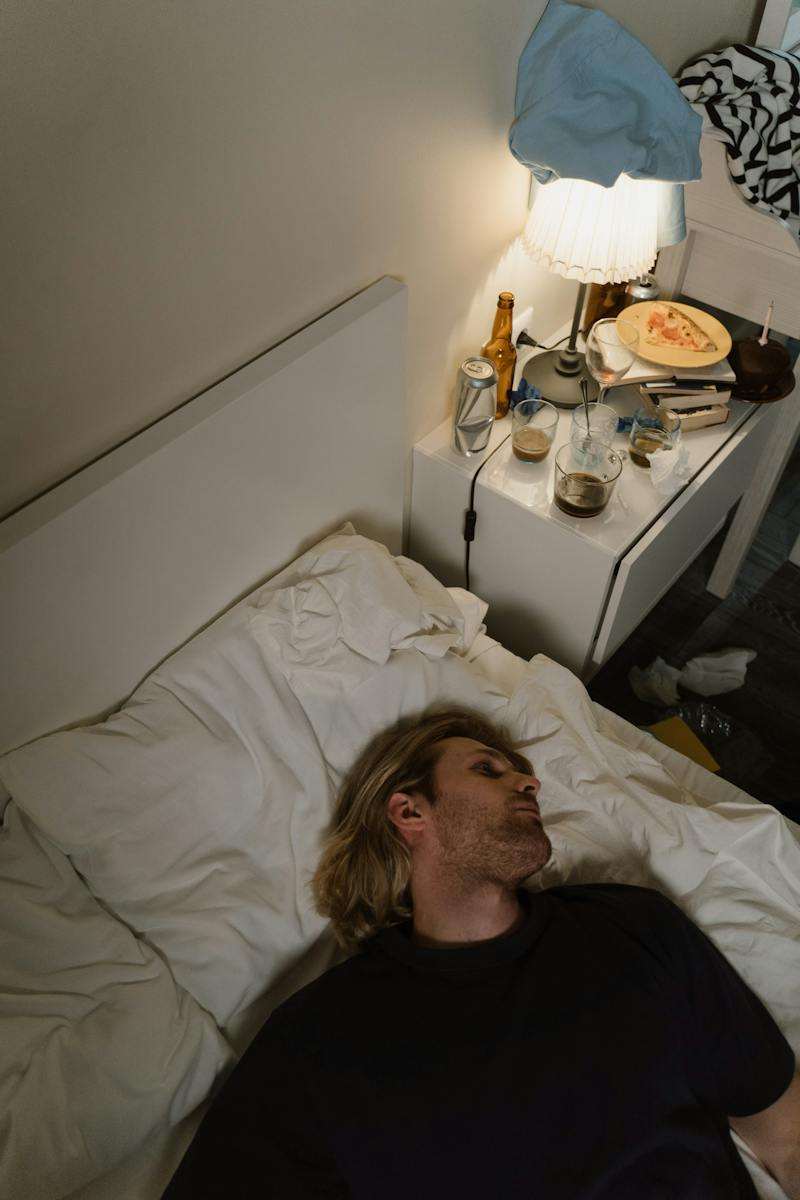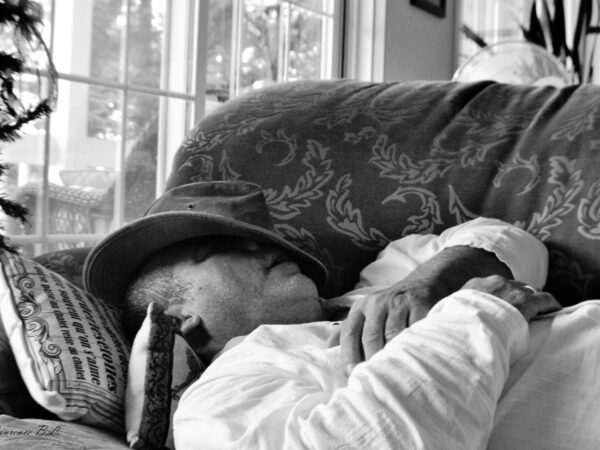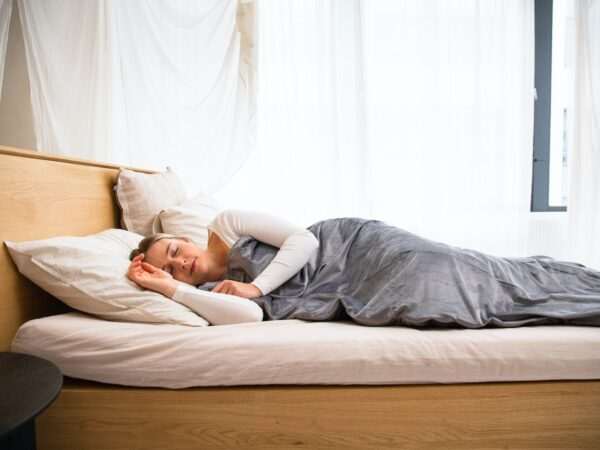Summary. Do you suffer from chronic insomnia? If so, you know how hard it can be to get a good night’s sleep. Sleep medications may offer temporary relief, but they often come with unwanted side-effects. But, it is possible to beat chronic insomnia without sleeping pills using simple lifestyle hacks. These hacks include making sure to create a night-time routine, avoiding caffeine late in the day, exercising and getting outside during the day, and making sure to go to bed and wake up at the same time every day.
Are you struggling with chronic insomnia? Do you often feel helpless when it comes to finding solutions to get a good night’s sleep? Have you tried every prescription sleeping pill on the market to no avail? If so, don’t despair. You can beat chronic insomnia without resorting to sleeping pills with some simple lifestyle changes.
The first and potentially most effective way to beat chronic insomnia without sleeping pills is by changing your sleep environment. Try to make your bedroom as dark, quiet, and cool as possible—all of which can help create an environment that promotes better sleep.
Recognizing and Understanding Different Types of Chronic Insomnia
People affected by chronic insomnia often find themselves lying awake at night, struggling to fall asleep, staying asleep, or waking up before they’re ready. But while most people are familiar with the symptoms of chronic insomnia, many don’t know the underlying causes. As such, it can seem like a perplexing and frightening problem, without much hope for relief. However, this isn’t necessarily the case. In many cases, it’s possible to beat chronic insomnia without needing medication or other forms of medical intervention.
As mentioned before, this can be difficult since there are many possible causes. Some common culprits include: shift work, jet lag, depression, anxiety, over-stimulation at night, an inconsistent sleep/wake schedule, and poor sleep hygiene habits. Each of these possible underlying issues requires a different approach to manage, but certain strategies work better for some than for others.
For instance, those who suffer from depression or anxiety may benefit from cognitive-behavioral therapy, while those with inconsistent schedules may need to work on regularizing their bedtime routines. In addition to better recognizing what might be at the root of your chronic insomnia, you can also use non-medical strategies to help you sleep better at night. This can include things like exercising regularly (but not too close to bedtime), avoiding caffeine in the evening, and establishing a regular bedtime routine.
Good sleep hygiene is also key for beating chronic insomnia without sleeping pills. This means avoiding things like drinking alcohol before bed, engaging in stimulating activities (like playing video games or working on the computer) in the hours leading up to bed, and avoiding large meals late at night.
Uncovering the Causes of Chronic Insomnia

In order to treat chronic insomnia, we must first uncover and address the underlying issue, or issues, that are causing the disturbed sleep. The first possible cause of chronic insomnia is sleep hygiene, meaning the habits we practice related to bedtime and the environment we prepare for sleep. It can be difficult to fall asleep in a room that’s too bright, too noisy, too hot, too cold, or even too cluttered with extra items.
Additionally, when it comes to developing good sleep hygiene, it’s often beneficial to avoid alcohol, caffeine, nicotine, and certain medications close to bedtime (e.g, certain antihistamines, complementary medicines, and cold or flu remedies). Stress and anxiety can also be the cause of chronic insomnia. Mental health can play a pivotal role in obtaining a good night’s sleep, especially if a person is experiencing stress or anxiety at bedtime.
Cognitive behavior therapy and relaxation techniques can be beneficial in getting stress and anxiety under control. Taking part in activities such as yoga, tai chi, and mindfulness can help relieve stress in the body and the mind. Looking at lifestyle choices is also important when it comes to uncovering the cause of chronic insomnia.
Exercise has been shown to reduce insomnia symptoms and improve overall quality of sleep, while also providing necessary stress-relief. Eating a balanced diet and keeping regular eating and sleeping schedules can also be beneficial in getting the body and mind “back on track”. Chronic insomnia can be difficult to live with and it’s important to uncover the underlying causes before embarking on how to beat chronic insomnia without sleeping pills.
The Impact of Chronic Insomnia: Psychological, Physical, and Emotional
Lasting insomnia can cause a wide range of health-related issues, from fatigue and memory problems to irritability and difficulty concentrating, and can even lead to depression and anxiety in some cases. Fortunately, there are strategies that you can use to reduce the effects of chronic insomnia on your health and wellbeing.
This includes creating a sleep environment that is free of distractions and disruptions, maintaining a consistent sleep schedule, and avoiding stimulants like caffeine or nicotine close to bedtime. Additionally, making small lifestyle changes such as reducing stress, engaging in regular physical activity, and avoiding large meals close to bedtime can help to make it easier to fall asleep and stay asleep. Aromatherapy and relaxation techniques can also be helpful in quelling sleeplessness. It is also important to recognize the connection between chronic insomnia and other mental health issues.
Cognitive-behavioral therapy (CBT) can be especially helpful as it can help to identify and modify the thoughts and behavior patterns that are exacerbating the problem. Finally, while medications can be an effective short-term treatment for insomnia, they are not always recommended as a long-term solution. If medications are prescribed, they should be taken as directed and the doctor should be consulted about any potential risks associated with taking them.
Behavioral Changes for Treating Chronic Insomnia

If you are struggling with chronic insomnia, there are a range of behavioral changes you can make to get a restful night’s sleep. First off, it’s important to take an honest look at your lifestyle habits. Exercise is a great way to help your body unwind, so be sure to add some regular physical activity to your schedule. Regular exercise should also help to reduce stress, which can be a major factor in chronic insomnia.
Next, pay attention to your bedtime routine. To prepare for a good night’s sleep, it’s best to avoid caffeine and alcohol late in the day, as well as any electronics that cause stimulation. You should also stick to a regular bedtime and wake-up schedule, as this will help to establish a strong rhythm for restful sleep.
Crafting an Effective Sleep Routine to Combat Insomnia

Getting rid of insomnia is possible, however, with a few simple changes to your sleep habits. Here are a few tips to help people struggling with insomnia craft a more effective sleep routine and get a better night of rest without relying on sleeping pills or other pharmaceuticals. First and foremost, you should aim to maintain a consistent sleeping schedule.
This helps create a cycle of strong and consistent sleep habits, on which your body can depend. Adolescents and young adults should get a minimum of 8 hours of sleep, and adults should try to get at least 7 or 8 hours of sleep per night. In addition, you can help promote more restful sleep by avoiding stimulants like caffeine and nicotine close to bedtime.
This will give your body and brain more time to relax during the later hours of the night. Additionally, eating a light snack that consists of complex carbohydrates and proteins, such as peanut butter on whole wheat toast, can help impact your melatonin levels before you go to bed so that you feel calmer and more sleep ready.
Exercise also helps reduce stress, which often keeps many individuals from falling asleep. And lastly, if your environment isn’t conducive to falling asleep, such as if it’s too hot or cold, or if there’s too much light or noise, then you should try to rectify those issues with fans, lights, curtains, a sound machine, or a comfortable, supportive bed.
Stress-Reduction Strategies to Help with Chronic Insomnia
The good news is that many forms of stress-reduction may help to alleviate the symptoms of chronic insomnia, without the need for costly sleeping pills or other medications. Stress-reduction doesn’t have to be a cumbersome process.
Listening to calm music, doing something creative, or taking a walk outside, can offer a break from the stresses of the day, and allow your body to transition more smoothly into sleep. Cultivating good sleep habits can also help to beat chronic insomnia without sleeping pills.
Going to bed at the same time each night, and getting up at the same time in the morning, can help your body to adjust, and may reduce the amount of time spent tossing and turning in bed. Limiting the amount of time spent in the bedroom when you are not sleeping is also important, as associating the bedroom with sleep, rather than wakefulness, is an important part of helping your body and mind relax enough for sleeping.
Of course, these activities should always be completed in moderation, as too much exercise can have the opposite effect, and leave us too wired and energized for sleep.
How Diet and Exercise Help Treat Chronic Insomnia

The first step is to create a regular and healthy eating schedule. Eating balanced meals on time can help regulate your biological clock, and ensure that your body is prepared for regular sleeping hours.
Additionally, it can be helpful to avoid heavy meals close to bedtime, as this can interfere with your body’s relaxation process. Exercise is also an important part of treating chronic insomnia. Taking up regular physical activities can help your body feel tired and ready for rest.
It also helps improve your overall physical and mental health, and is known to reduce stress levels. It is important to not overexert yourself, however; try to finish your exercise regimen at least four hours before bedtime. This will allow your body to cool down and to start into relaxation mode for sleeping. In addition to physical exercise, it can be helpful to incorporate relaxation activities into your daily schedule.
It is also important to maintain overall calm and avoid activities that can cause stress. Finally, it can be helpful to create a relaxing sleeping environment. Try to avoid screen time such as watching television or working on the computer close to bedtime. These activities interfere with your body’s natural relaxation process.
Natural Remedies for Beating Chronic Insomnia
Exercise increases endorphins, which are the hormones helping to make us feel alert and energized. Doing regular physical activity five days a week for at least thirty minutes is suggested to help with chronic insomnia. Not only does it help you feel more alert through the day, it can reduce anxiety levels.
The blue light emitted from computer and phone screens can disrupt circadian rhythms, making it difficult to fall asleep. Using red or yellow lensed glasses can help to minimize blue light exposure and give your body the signal that it is time to prepare to rest. Take magnesium supplements. Magnesium is a natural supplement that has numerous calming and sleep inducing properties.
Taking it a few hours before going to sleep will help to reduce your anxiety levels and help you to get a good night’s rest. Practice deep breathing. Taking deep breaths helps to reduce stress and promote a feeling of calm and relaxation.
It can help to quiet your mind and steady your pulse, leading to a more peaceful slumber. Create a calming, sleep-inducing environment. Reduce ambient noise, such as traffic or loud neighbors. Ensure that the temperature is comfortable and opt for light and breathable bedding.
The End Of The Journey
How to beat chronic insomnia without sleeping pills? A good night’s sleep is crucial for physical and mental health and well-being. For those struggling with chronic insomnia, there are many forms of self-help treatments that have been proven to be helpful in getting a good night’s sleep and beating chronic insomnia without sleeping pills.
The most important step to take is to implement good lifestyle and sleep hygiene practices. This means eliminating stimulants in the evening such as caffeine, as well as avoiding late night exercise and television. It also includes setting a regular schedule for when to go to bed and when to wake up and sticking to it. Additionally, creating an environment that is conducive to sleep and free of stress and distractions is essential.
Research has shown that CBT-I is a safe and effective non-pharmacologic treatment for insomnia. It works to change negative patterns of thinking and behavior related to sleep, giving the patient the tools to better understand the patterns they have created and start to develop better sleep habits. Relaxation techniques such as meditation, visual imagery, progressive muscle relaxation, and yoga can also be used to reduce stress levels and improve sleep.
Yoga is especially helpful as it helps to relax both the body and the mind, which can be beneficial for those suffering from insomnia. Deep breathing and mindfulness meditation can also be used to ease tension, as can aromatherapy, where essential oils are used to trigger relaxation. There are also some natural supplements available in health stores that can help provide relief from insomnia without the use of sleeping pills.
FAQs Uncovered: Get The Facts Here
Can chronic insomnia be cured?
There are treatments available that can help improve sleep and prevent symptoms from occurring, such as cognitive behavior therapy, relaxation techniques, and medications. It’s important to talk to a healthcare professional to determine the right treatment plan for you.
What is chronic insomnia a symptom of?
Chronic insomnia can be a symptom of many underlying physical or mental health issues, such as stress, depression, anxiety, sleep apnea, certain medications, chronic pain, or a medical condition.
What triggers chronic insomnia?
Common triggers include stress, anxiety, certain medications, chronic illnesses and pain, sleep schedule disruption, environmental factors such as noise, light, and temperature, and certain substances such as caffeine, alcohol, and nicotine.
Does chronic insomnia ever go away?
Often times, treatment and lifestyle changes are necessary in order to achieve relief. Treatment may include cognitive behavioral therapy, medications, or lifestyle changes, such as avoiding caffeine and engaging in regular exercise or relaxing activities before bed.
What is a long term chronic insomnia?
It is often the result of underlying medical or psychological issues, such as depression, anxiety, or substance use. Chronic insomnia is known to have significant impacts on quality of life and can lead to increased risk of illness.
Used Reference Links:
https://www.webmd.com/sleep-disorders/remedies-for-insomnia
https://www.healthline.com/health/healthy-sleep/insomnia-home-remedies















